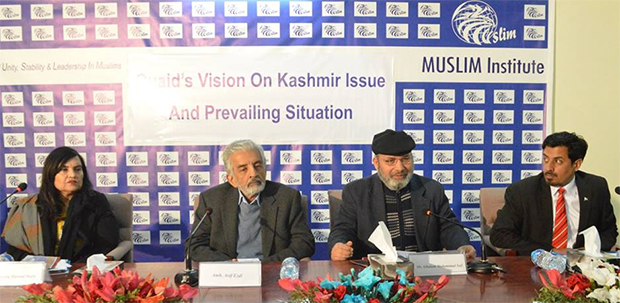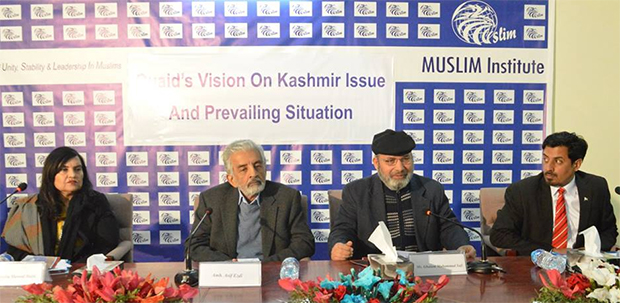
Quaid-e-Azam Muhammad Ali Jinnah believed without Kashmir, Pakistan is incomplete: Speakers
Round Table Discussion organized by MUSLIM Institute
ISLAMABAD ( WEB NEWS )
MUSLIM Institute organized a round table discussion on “Quaid’s Vision on Kashmir Issue and Prevailing Situation” at National library, Islamabad.
Eminent scholars and political leaders from Pakistan participated in the discussion and expressed their views on the subject. Convener Tehreek-e-Hurriyat Jammu & Kashmir, Pakistan Chapter, Ghulam Muhammad Safi, Former Ambassador & Renowned Columnist Asif Ezdi, Renowned Columnist, Ayesha Masood and Research Associate MUSLIM Institute Tahir Mehmood, and others spoke on the event.
Speakers expressing their views observed as under: Quaid-e-Azam Muhammad Ali Jinnah believed that without Kashmir, Pakistan is incomplete. He tried his best to liberate Kashmir from Indian illegal occupation. Quaid’s commitment with Kashmir and Kashmiri people was unfaltering. Quaid’s vision on Kashmir is unequivocal. Quaid knew very well the importance and significance of Kashmir for Pakistanis as well as for Kashmiris.
He paid attention to the miserable conditions of Kashmiris even when there was no one to heed their hues and cries. Quaid vociferously condemned the Indian aggression on Kashmir. He wanted the peaceful settlement of the dispute but he was also determined to go to any extent to liberate Kashmir from Indian clutches, which is evident from his bold step to issue orders to the then Commander-in-Chief of Pakistan Army, General Douglas Gracey to dispatch troops to Jammu and Srinagar.
According to Dr. Riaz Ali Shah’s diary, Quaid-e-Azam said, during his illness in Ziarat, “Kashmir is the Jugular vein of Pakistan and no nation or country would tolerate its Jugular vein remains under the sword of the enemy”. Not only the Jugular vein of Pakistan but also that of Kashmiri community in particular has been under the sword of the enemy for the last sixty eight years.
Quaid-e-Azam’s interest in Kashmir is evident from the fact that he explained the significance of the name of Pakistan to Mountbatten on May 17, 1947 as “The derivation of the word Pakistan– P for Punjab; A for Afghan (i.e. Pathans of NWFP); K for Kashmir; I for nothing because that letter was not in the word in Urdu; S for Sindh and Tan for the last syllable of Baluchistan”.
Quaid-e-Azam supported the Kashmir cause even before the independence of Pakistan. It was his desire that Kashmiris especially Muslims should get their socio economic rights and justice. During the period of Dogra Raj in Kashmir Muslims were dealt in very cruel manner, women were treated like herd of animals. In 1926 when Quaid visited Kashmir he came to know that Kashmiri Muslim sent a delegation to the then viceroy and submitted a memorandum to take notice of the miseries of Kashmiri people.
That delegation when returned they were tortured, their lands were snatched. When Quaid came back, a unanimous resolution was passed in the meeting of Muslim League at Lahore, which addressed maharaja to take care of the educational and economic rights of the Muslims.
Allama Iqbal was also on the same footings as Quaid, taking notice of the maltreatment of Kashmiris, in 1931 president of Muslim League Allama Iqbal declared that Muslims of Sub continent should observe 14 August as the Kashmir day.

